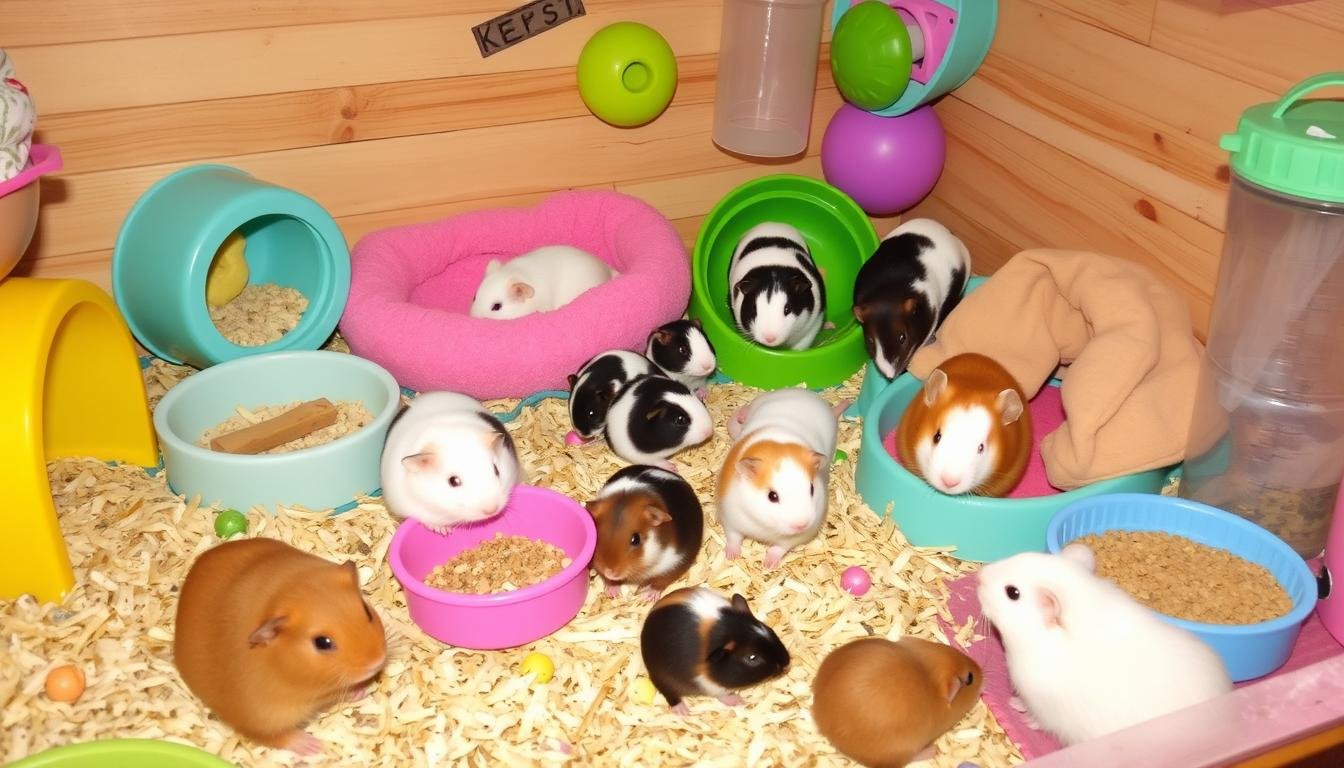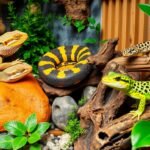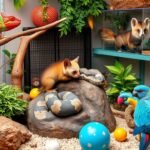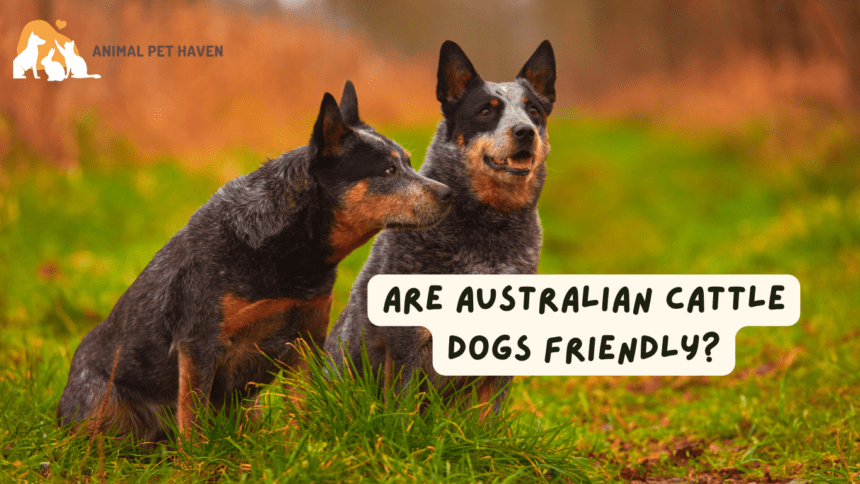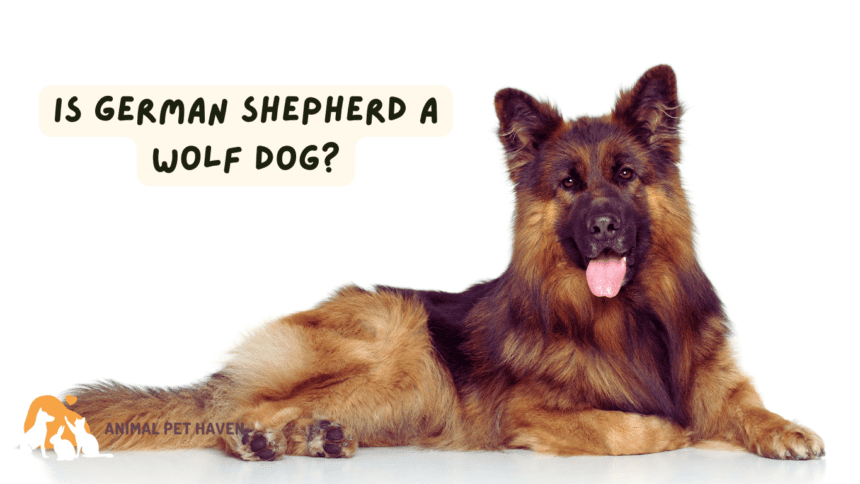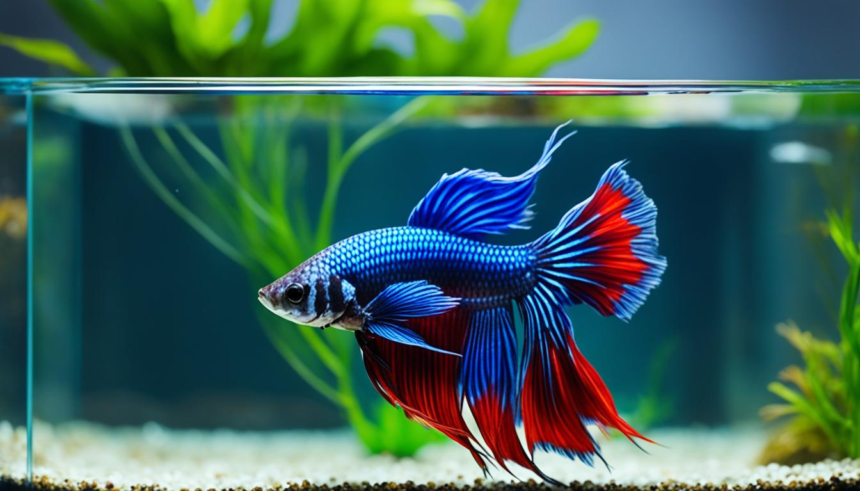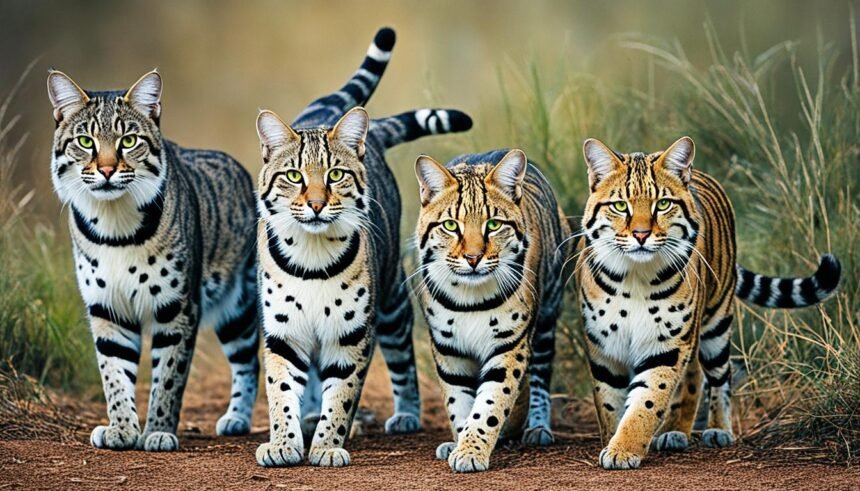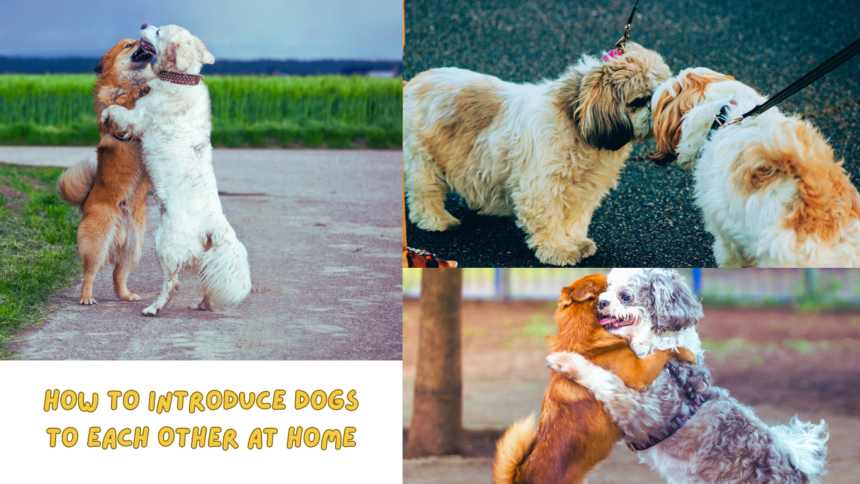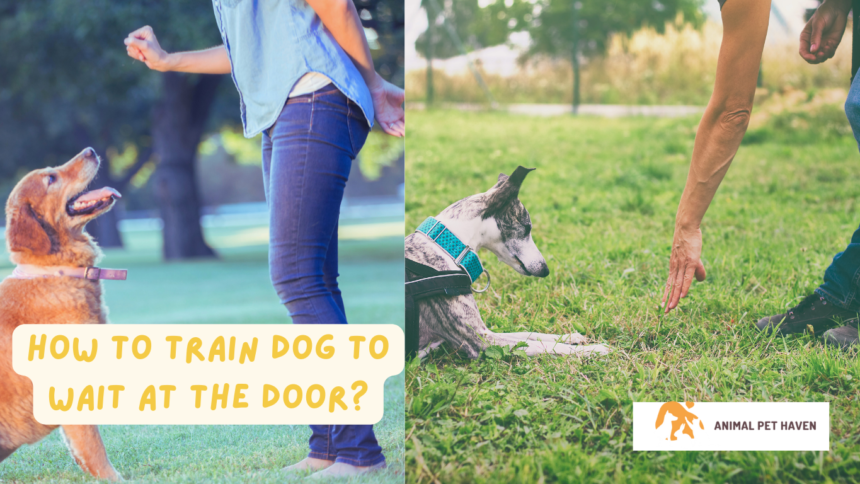Caring for pet rodents like rabbits, guinea pigs, and hamsters is a big responsibility. It’s important to make sure they are comfortable and healthy. You’ll need the right supplies to create a great home for them.
Things like the right cage, bedding, food dishes, and toys are key. Each rodent has its own needs. Knowing these and getting the right supplies will make your pet happy and healthy.
Understanding Different Types of Pet Rodents
Rodents are a favorite among pet owners. They come in many species, each with its own care needs and social requirements. Whether you’re thinking of a playful rat, a curious mouse, or a cuddly guinea pig, knowing their specific needs is key. This ensures a healthy and happy home for your pet.
Popular Rodent Species for Pets
- Rats: Intelligent and social, rats often form strong bonds with their owners. They require a spacious habitat and stimulating activities to thrive.
- Mice: Lower maintenance and suitable for apartment living, mice are delightful companions but have shorter lifespans than larger rodents.
- Guinea Pigs: Gentle and affectionate, guinea pigs are known for their social nature and need for companionship, either with other guinea pigs or attentive owners.
- Hamsters: Solitary by nature, hamsters are independent pets that can be housed individually. They are active and enjoy exploring their environments.
Unique Care Requirements by Species
Each rodent species has its own care needs. For example, rats and mice need a varied diet of pellets, hay, fresh veggies, and occasional fruits. Guinea pigs, on the other hand, need more vitamin C. It’s also important to get the cage size, bedding, and temperature right for your pet’s health.
Social Needs and Living Arrangements
Rodents are social creatures, and their living arrangements can greatly affect their happiness and health. Some, like rats, do well in pairs or groups, while others, like hamsters, prefer to be alone. Think about your chosen rodent’s social needs and provide the right living space for their well-being.
Choosing the Right Housing and Cages
Keeping rodents as pets requires the right housing. The cage’s size and design are key to their health. You must consider the species’ needs, ventilation, temperature, and safety.
Cage Size Requirements
Rats need at least 5 cubic feet of space per rat. This allows them to run, climb, and explore. The Critter Nation cage, for example, offers 31.5 cubic feet for up to six rats.
Younger rats need smaller spaces. Bar spacing should be no more than 3/8 inches for them. Adult rats can handle up to 1 inch to prevent escapes.
Material Considerations and Safety Features
Choose cages made from durable, chew-resistant materials. Wire cages with solid floors are best. They prevent injuries and keep your pet safe. Avoid cages with thin materials or sharp edges.
The Rat Manor cage is great for 2-3 baby rats until they’re 6 months old. It’s designed to last up to 16 years, making it a long-term housing solution.
Ventilation and Temperature Control
Good ventilation is essential for your rodents’ health. The cage should let in fresh air and prevent ammonia buildup. Rats prefer temperatures between 19-23°C (66-73°F).
By focusing on these factors, you can create a safe, comfortable home for your pet rodents. This will support their health and happiness.
| Feature | Recommendation |
|---|---|
| Minimum Cage Size for Rats | 5 cubic feet per rat |
| Bar Spacing for Younger Rats | 3/8 inches or less |
| Bar Spacing for Adult Rats | 1 inch maximum |
| Critter Nation Cage Size | 31.5 cubic feet, can accommodate up to 6 rats |
| Rat Manor Cage Usefulness | Can house 2-3 baby rats until 6 months old |
| Rat Manor Cage Lifespan | 16 years of use |
Essential supplies for keeping rodents as pets
When you have rodents as pets, the right supplies are key. Rats, hamsters, and guinea pigs need special things to stay healthy and happy. They need the right equipment and accessories to thrive.
A secure and spacious cage is a must. Rats need at least 2 cubic feet of space. This space helps them move and socialize without health risks.
Bedding and nesting materials are also crucial. They make your pet’s home comfy and clean. Choose safe options like recycled paper or aspen shavings.
- Secure, well-ventilated cage or habitat
- Appropriate bedding and nesting materials
- Food and water dishes or bottles
- Chew toys and enrichment items
- Exercise wheel or other activity equipment
- Hiding spots or shelters
- First aid kit and grooming supplies
Don’t forget a balanced diet and clean water. Toys and activities are also important. Treats should be only 10% of their diet, focusing on healthy foods like veggies and fruits.
With the right rodent supplies and pet care essentials, you can make a great home for your pets. This ensures they stay happy and healthy.
Bedding and Nesting Materials
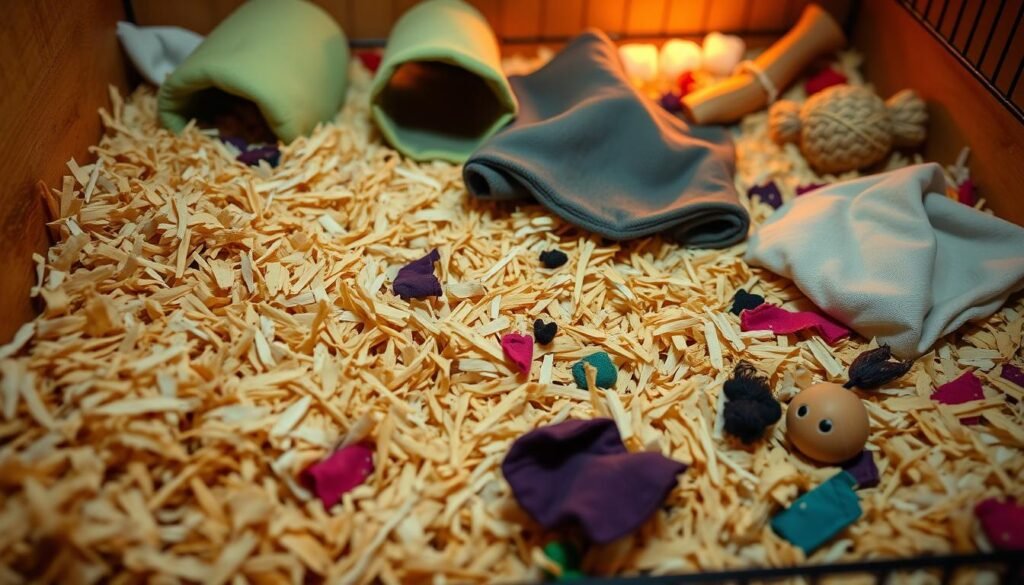
Keeping a clean and cozy home is key for your pet rodents’ health. There are many safe and comfy options for bedding and nesting materials.
Safe Bedding Options
Fresh News Recycled Paper Small Animal Litter is a top pick for its ability to soak up moisture and feel soft. Wood chips, except for aspen, and cellulose-based chips are also great choices. Make sure to have at least 2cm of bedding to let them burrow naturally.
Nesting Material Requirements
Rodents love to nest, and the right materials are crucial for their comfort. Avoid using materials that soak up a lot of water for young ones to prevent getting tangled. Instead, give them shredded paper, cotton balls, or a bit of hay or straw to help them nest.
Cleaning and Maintenance Schedule
The cage needs a deep clean every one to two weeks, with daily quick clean-ups to get rid of dirty bedding. Clean in the early evening to not disturb them. Always keep the cages separate to avoid scent problems.
Good bedding and regular cleaning are vital for your rodent’s health and smell control. By keeping their homes safe, comfy, and clean, you’ll make sure they live well and happily.
Feeding Equipment and Food Storage
It’s key to feed your pet rodents a balanced diet for their health. Choose high-quality pelleted food made for rodents, like Cunipic. These pellets should be about 90% of their daily food.
Add fresh fruits and veggies, but only 5-10% of their diet. Don’t give them seeds or nuts because they’re too fatty. Use strong ceramic bowls, like the Living World Pink Ergonomic Small Pet Dish, to keep food from spilling.
| Recommended Rodent Diet | Percentage |
|---|---|
| Pelleted Food | 90% |
| Fresh Fruits and Vegetables | 5-10% |
| Treats (Seeds, Nuts) | Less than 5% |
Keeping food fresh is important for your pet’s diet. Store rodent food in airtight containers, away from sunlight and heat. This keeps it fresh and safe from contamination. Always have fresh food ready for your pet.
Water Bottles and Hydration Systems
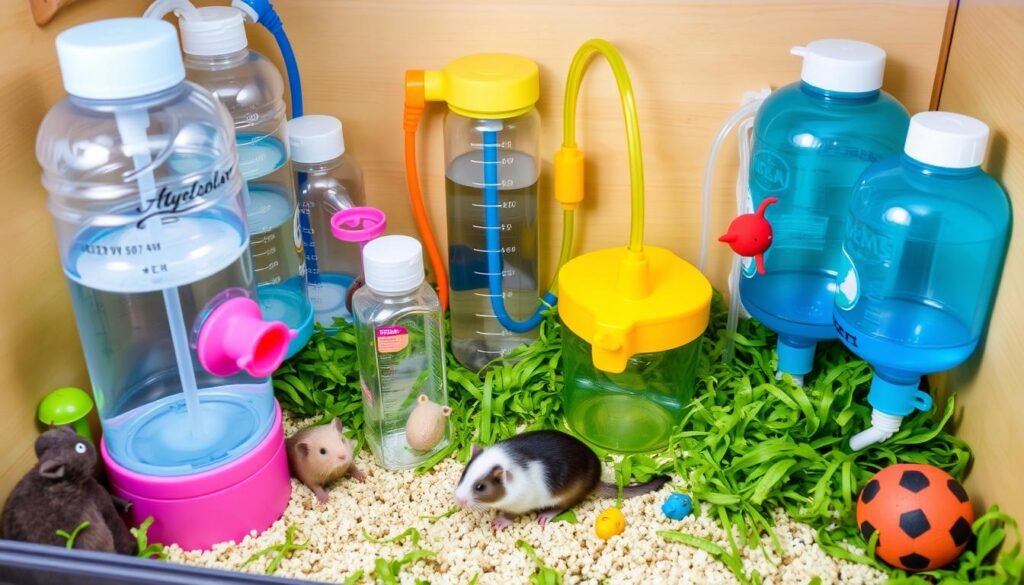
Keeping your pet rodents hydrated is key to their health. There are many water bottles and systems to choose from. These products make sure your pets always have clean, fresh water.
Types of Water Bottles
Chew-resistant water bottles are a top pick for pet rodents. The Kaytee Chew-Proof Small Animal Water Bottle is a great example. It’s tough and has sipper tubes for easy drinking.
Think about your rodent’s cage size when picking water bottles. Taller cages might need bottles at different heights for easy access.
Proper Installation and Maintenance
It’s important to install and maintain your rodent’s water bottles right. Clean and refill them daily. Make sure the sipper tube works well. This keeps the water clean and fresh.
Quality water bottles and regular care are vital for your pet rodents’ health. Hydration is a big part of caring for them.
| Product | Capacity | Key Features | Price |
|---|---|---|---|
| Lixit Wide Mouth Rabbit Water Bottle | 64 oz | 45° wide mouth for easy cleaning and filling | $23.99 |
| Oxbow Enriched Life Chew Proof Glass Water Bottle | 16 oz | Durable glass construction, leak-proof design | $12.99 |
| Petsafe Drinkwell Butterfly Pet Fountain | 50 oz | Continuous fresh, flowing water with a cute butterfly topper | $49.99 |
Exercise and Entertainment Accessories
Keeping pet rodents active and engaged is key for their health. The right accessories can make their lives better. From exercise wheels to climbing structures, these items improve their quality of life.
Exercise wheels are a favorite among rodent owners. The Niteangel Super-Silent Hamster Exercise Wheel comes in four sizes and nine colors. It’s quiet and smooth, making it a top choice. For more fun, try the Niteangel Cardboard Paper Tunnel Set and the Niteangel Multi-Chamber Hamster House Maze. They offer mazes and tunnels for your pet to explore.
To encourage natural chewing, consider the Niteangel Natural Wooden Tunnel Tube Toy or the Oxbow Enriched Life Play Wall. They have different textures and materials for chewing. These toys not only satisfy their chewing instinct but also keep them mentally and physically active.
For climbing and suspension fun, check out the Niteangel Small Animal Suspension Bridge and the Imperial Cat Play ‘N Shapes Cheese Small Animal Habitat Enhancer. They provide vertical spaces for your pet to explore and climb. These accessories meet their natural instincts, ensuring a well-rounded experience.
Adding a variety of exercise and entertainment accessories can make your pet’s environment stimulating. Regular playtime and access to these items are vital for their health. They keep your furry friends happy and healthy.
| Accessory | Features | Benefits |
|---|---|---|
| Niteangel Super-Silent Hamster Exercise Wheel | Available in four sizes and nine colors, quiet and smooth running | Promotes physical exercise and reduces stress |
| Niteangel Cardboard Paper Tunnel Set | Multiple tunnel pieces using chew-safe cellulose cardboard | Encourages exploration and natural burrowing behaviors |
| Niteangel Multi-Chamber Hamster House Maze | Various configurations, including a small 3-room design | Provides mental stimulation and opportunity for exploration |
| Niteangel Natural Wooden Tunnel Tube Toy | Made from natural fir wood with nine holes drilled in the log | Satisfies the rodent’s natural chewing instinct and offers enrichment |
| Oxbow Enriched Life Play Wall | Available in two sizes, includes a variety of chewing materials | Promotes physical activity and mental stimulation through chewing |
| Niteangel Small Animal Suspension Bridge | Available in four different sizes, with the largest walkway more than 25.5 inches long | Encourages vertical exploration and climbing behaviors |
| Imperial Cat Play ‘N Shapes Cheese Small Animal Habitat Enhancer | Hanging toy made from corrugated cardboard tube with round wooden plugs on each end; dimensions are 12 x 2.76 x 2.8 inches | Provides a fun and engaging environment for rodents to climb, jump, and explore |
| Trio of balls made of water hyacinth, seagrass, and rattan | Each ball measuring 2.6 inches in diameter | Offers natural textures and materials for rodents to interact with and chew on |
Health and Hygiene Supplies
Keeping your pet rodents healthy is key. Use pet-safe cleaning products to keep their home clean. This reduces germ risks, especially for young kids and older folks.
Cleaning Products and Disinfectants
Choose cleaning solutions made for small animal homes. They’re safe for your pets. Clean their space and toys often to stop sickness spread. Clean outside when you can to avoid dirt.
First Aid Kit Essentials
Make a first aid kit for your rodents. Include sterile gauze, tweezers, and safe antiseptic. This helps with small injuries quickly.
Be careful with small mammal wounds, especially for those with weak immune systems. If your pet looks sick or gets hurt badly, get help fast.
FAQ
What are the essential supplies needed for keeping rodents as pets?
To care for pet rodents, you’ll need the right housing, bedding, and food. Don’t forget water bottles, toys, and ways to keep them entertained. Getting everything ready is key to a happy home for your pet rodent.
What are the different types of pet rodents and their unique care requirements?
Many rodents make great pets, each with its own needs. Rats are smart and social, while mice are easier to care for and fit well in small spaces. Some rodents like company, while others are happy alone. Think about what your pet needs before choosing.
What factors should be considered when choosing the right housing and cages for pet rodents?
The right cage is vital for your rodent’s health. Rats need at least two cubic feet of space. Choose cages with solid floors to avoid injuries. They should also have good ventilation and be made of durable materials like metal or strong plastic. Keeping the temperature right is also important for your pet’s comfort.
What are the essential supplies needed for keeping rodents as pets?
You’ll need a safe cage, bedding, and dishes for food and water. An exercise wheel, toys, and places to hide are also important. Items like a Chew Proof Small Animal Crate and a Kaytee Chew-Proof Small Animal Water Bottle are good choices. These supplies help keep your pet happy and healthy.
What are the best bedding and nesting materials for pet rodents, and how often should the cage be cleaned?
Safe bedding includes paper products like Fresh News Recycled Paper Small Animal Litter. Add nesting materials for comfort. Clean the cage daily by removing soiled bedding. Do a deep clean once a week. Keeping the cage clean is key for your rodent’s health and to prevent bad smells.
What type of feeding equipment and food storage is recommended for pet rodents?
Give your rodent a balanced diet with high-quality pellets. Use ceramic dishes to prevent spills. Fresh fruits and veggies are okay as treats, but not more than 10% of their diet. Store food in airtight containers to keep it fresh and safe.
What water bottles and hydration systems are best for pet rodents?
Choose water bottles that rodents can’t chew through, like the Kaytee Chew-Proof Small Animal Water Bottle. Install multiple bottles in tall cages for easy access. Clean and refill them daily to ensure your pet stays hydrated.
What types of exercise and entertainment accessories should be provided for pet rodents?
Offer toys and accessories for fun and exercise. Solid plastic exercise wheels and climbing structures are great. Chew toys and items like the Trixie Suspension Bridge Small Pet Hammock provide entertainment and enrichment.
What health and hygiene supplies are necessary for pet rodents?
Use safe cleaning products like Absolutely Clean Small Animal Cage Cleaner & Deodorizer for cage maintenance. Have a rodent first aid kit ready with essentials like sterile gauze and pet-safe antiseptic. Regular health checks and good hygiene practices are crucial for your pet’s well-being.

